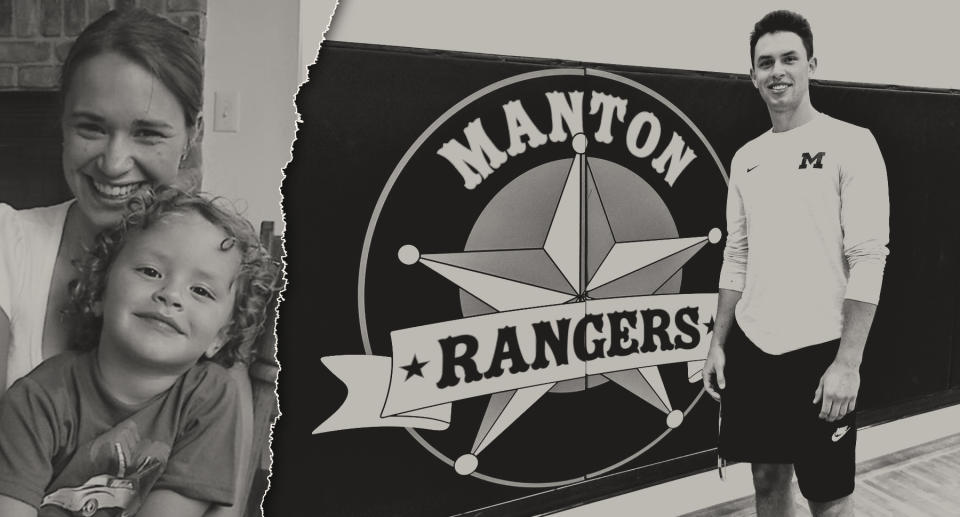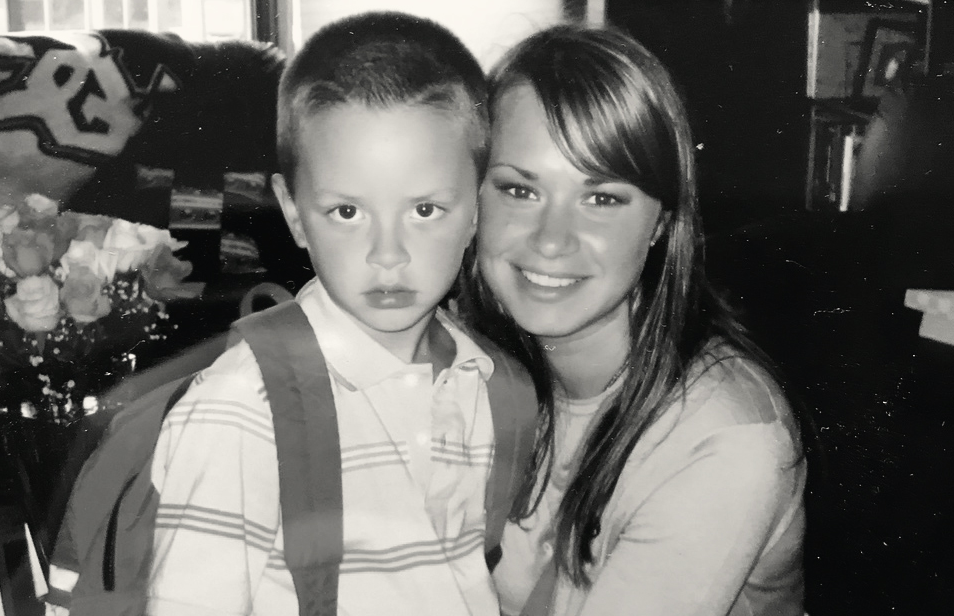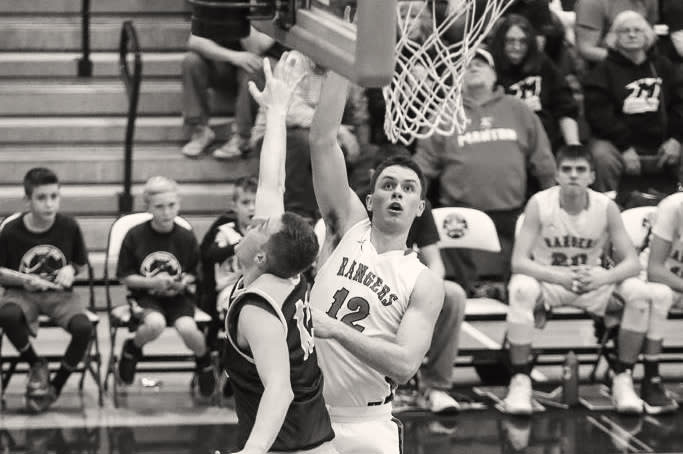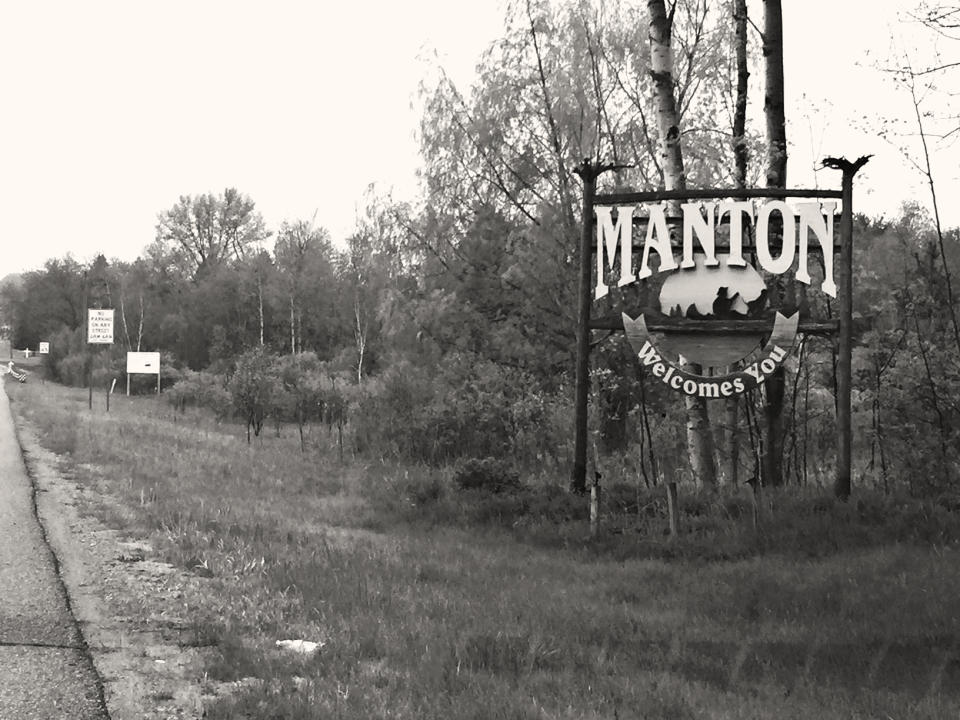The 'emancipation' of Ethan Ancick

MANTON, Mich. — In 2007, a mother went missing in Detroit. She attended a party at a yacht club on a September night after a boat regatta, had a few drinks and didn’t come home. The police were called. Only her purse and shoes were found.
The search drew some local media coverage, but not much. Details were scarce. The woman was 30, single, from Chicago, and she had a 7-year-old son. The family didn’t tell the little boy what was going on, and for days the boy sat by the door, looking out the window, wondering when Mommy would return.
Police found the woman’s body in the Detroit River two days after her disappearance. No foul play was suspected, but no answers were offered, either. A few days after that, the family told the little boy to get dressed up in fancy clothes. He wasn’t told why. The boy got frustrated and demanded to know what was going on. His aunt and his grandmother finally looked him in the eyes and told him: Mommy wasn’t coming home.
Later that day, Ethan Ancick was staring at his mother’s open casket.
*****On a cloudy morning in May, the graybeards at the Merry Inn in this northern Michigan town gather for a Logger’s Breakfast of eggs, toast and sausage. The waitress, Linda, walks carefully to each wooden table and pours the coffee. There are enormous cinnamon rolls on the counter, billowing off the pan and slathered in icing. Truckers sometimes filter off the main highway to pick up some of these rolls on the way north to Traverse City or south to Cadillac. But that highway, M-131, takes most travelers past this town instead of through it, and so the rolls are more of a secret than they should be.
One thing is not a secret in this no-grocery-store, two-stoplight town, and that is the star high school basketball player. When a visitor to the Merry Inn mentions he’s heard of a pretty good athlete around these parts, one of the old men looks up from his empty plate.
“You mean Ethan?”
A 6-foot-6 17-year-old walks through the hallway of K-12 Manton Consolidated Schools with the brimming confidence that so many high school seniors have. He is tall and poised, with a muscular build and an easy smile. One younger boy peeks out of a door at the local hero, nodding and smiling sheepishly. Everyone in town knows Ethan Ancick as the star center for the Rangers, as the standout student who is headed to the University of Michigan, as the handsome young man with a kind word for everyone.
What most don’t know about Ethan is the long road he took to get to this town, and that along the way he was one of hundreds of thousands of American students classified by their school as homeless.
*****

Seven years ago, a fifth-grader named Jayden came home one day and told his dad about a new kid at school named Ethan. He was pretty tall. “Maybe,” Jayden offered, “you could teach him some basketball?” Jason Perry, who coached his son and many of the other boys in the town, raised an eyebrow but didn’t do much more. At first.
More tales followed Jayden home. The new kid made an incredible catch of a football at recess. The new kid had a great arm. Jason eventually met this boy and the two played some catch. After about five minutes, the coach was struck. The kid was a natural. “Unbelievable,” he thought to himself. “This kind of talent? For this area?” He wondered where Ethan came from.
Anthony Ancick was 20 when Ethan was born. They were young parents, in love, but were drifting apart – first emotionally, then geographically.
“[His mother and I] were very different, but we were in love,” Anthony says. “I’ll never love anyone else like I loved his mother. It just didn’t work out.”
Ethan lived with his mom until all of the sudden she was gone. Father and son were reunited under the worst of circumstances. They lived in Florida and, for a time, things were OK. A few years later, they moved back north – to this pretty part of the state to build a home. Maybe that would be a fresh start, far away from the past.
“I was glad to have him back,” Anthony says. “I was excited about it. He handled the situation a lot better than the adults around him.”
At school, Ethan and Jayden became good friends. Jason would set up an open gym on Sunday nights when kids and their parents could play some basketball. Sometimes Ethan’s dad would stay. Sometimes he wouldn’t. “He would drop him off and go away,” Jason says, “and when he picked him up, all you could smell was booze.”
Anthony says he ran into difficulties in northern Michigan. His mom developed a tumor and needed emergency surgery. His relationship with his new wife didn’t work out. He felt lost. He turned to drinking. “I’ve struggled with it,” he says. “Being isolated and not having work. I’ll admit it. I’m not afraid to admit it.”
Ethan started to ask to stay over at the Perrys for weekends and, eventually, during the week. Ethan’s father didn’t object. “He never fought us,” Jason says. “He just let it happen. He knew Ethan was OK over here.”
But Ethan wasn’t always OK. At one point, the heat at his dad’s house shut off. There was hardly any food around. Ethan missed some days at school.
While all this went on, the basketball court became a second home for Ethan. “Sports is every kid’s way of getting away from what you have to think about at home,” he says. “You don’t worry about tonight; you worry about ‘Let’s get better, have fun.’ ”
Yet there was almost no fun at home. Ethan says his dad wasn’t always around the house. He remembers there was a time when his dad crashed his truck and stumbled home. He remembers a time when he tried to wake up his dad and he couldn’t. He says there was even a time when the power in the house shut off.
Anthony insists Ethan didn’t ever go without basic needs, and that he was intent about making sure he was cared for. But Ethan says there were moments when he felt panicked.
“I thought he was dead a couple times, because he wasn’t responsive,” he says. “Bottles all around him, on the couch. I had to break in a couple times.
“It’s my dad. I don’t want to bash him. I know he’s a good guy. He has values. He wants to see me succeed. It’s just … a mental issue.”
Ethan tried to take his father to court, so he could live with the Perrys. The judge ruled in favor of Anthony.
*****

One day after baseball practice, during his freshman season at Manton, Ethan’s dad picked him up and drove him hundreds of miles south. Ethan protested: “I have school tomorrow.” Anthony had a new opportunity in metro Detroit and had already enrolled his son in a new school.
Tina Perry, Jayden’s mom, cries at the memory. “We lost him,” she says.
Suddenly, Ethan was living with his father and his new girlfriend not far from where his mom passed. Ethan says his father’s drinking continued unabated, at all times of day.
“I’d go on walks and runs for miles, trying to get away,” Ethan says, “trying to get some sort of freedom.”
Ethan became suicidal at one point, he says.
Asked what kept him going, he says, “Sticking with sports, and my friends.”
“It turned into a big mess,” Anthony admits. “Between that, my divorce, the town, it was a mess. It was hard on everybody. He ultimately had to move to a foreign place when he was so happy up there. I felt it was time where I had to go.”
But he looks back now and takes responsibility for something he knew Ethan didn’t want to do. “It’s primarily on my shoulders,” he says.
After two years of texts and late-night calls to Manton, Ethan made a decision: He wanted to go back. His counselor there, Beth Wallin, said there was no guarantee he would be allowed to play sports. She also said Ethan would be considered by the school and the state to reside in a new category: homeless.
*****“Homeless,” in the educational sense, is not what you may think. It’s not necessarily living under a bridge or on a subway grate. For tens of thousands of elementary, middle and high school students across the country, it’s a lack of reliable shelter. That can mean anything from “sofa surfing” to living in a motel. In a state like Michigan, the issue is not just in the heart of cities like Detroit. There are school districts in northern regions where the homeless population rate is 15 percent or higher. Here in Manton, the number is north of six percent. It’s a national problem – one that’s hard to spot and harder to fix.
From 2011-16, the overall student homeless population in the United States rose 19 percent, to nearly 1.3 million. For the last year of available data, 2016, the number of unaccompanied homeless youth reached 100,000 for the first time ever. If you talk to a homelessness expert, they will likely say the actual number of students in that category is more than any official number.
That’s part of the crisis: many students experiencing homelessness do not announce themselves. These are the “hidden homeless” – kids who are struggling without anyone knowing. Sometimes they are shy; sometimes proud; sometimes fearful. In rural areas without many homeless shelters, one study showed the chances of being caught up in sex trafficking spike by 40 percent.
For kids like Ethan, sports can give them a reason to go to school, to find a routine that otherwise is missing, and to open up about their lives to new friends. Sports can bring shelter, physically and emotionally.
“One of the biggest risk factors for homeless students for not graduating is if they’re chronically absent,” says Jennifer Erb-Downward, who studies homelessness at Poverty Solutions at the University of Michigan. “We have to think of ways for them to be present and valued at school. Extra-curricular activities, and supporting adults, are really critical in how we get students to school and keep them engaged.”
Coaches are often the ones who find out what’s really going on at home. Sometimes they become the way a kid can get to school or home from practice. Sometimes they give troubled kids a parental figure. Sometimes they do all of the above.
But the face of homelessness doesn’t always look like the face of despair. Sometimes the face of homelessness is the face of optimism and resilience. Sometimes the face of homelessness can look like the face of the star basketball player.
*****

One night late last summer, Ethan loaded up his father’s truck and sped away, driving into the night toward his old town. He cried as he steered, fearful of the reaction of his dad and even his grandmother, who objected to the idea. But he was sure. He had one more year of high school, one more year with his team, and he wasn’t coming back.
Ethan arrived back in Manton last Aug. 21. The Perrys had kept his old room, including some of his Michigan gear still in it. Ethan also received something he hadn’t had much of during his childhood: chores. He had to stack wood, do laundry, help clean up, watch Jayden’s little sister, Ella. He still uses the same word when he describes his new life: “emancipation.”
Yet there was still difficulty. A lot of it. There were upsetting text messages from his dad. Some suggested the boy had been “brainwashed.” Most of them caused him to panic and call Tina Perry. “We had several of those nights when he would get those texts or angry phone calls,” she says. “He had that look of fear. He was very worried. There was nothing illegal. He was 17. He came to the school here to enroll. But he still would get these texts. And he still does. There was always this roller coaster with dad. It was scary for me, too.”
Anthony says he was “heartbroken.”
“I couldn’t blame him and I couldn’t tell you I didn’t see it coming,” he says. “I wasn’t surprised.”
Little by little, more people became aware of Ethan’s struggle. “I’ve had so many people in this town say, ‘You need somewhere to live? Come stay with us,’ ” Ethan says. “I’ve had maybe 15 people say, ‘Come stay with us.’ ”
In his senior year, Ethan earned a GPA near 4.0. He got in to the University of Michigan’s nursing school. He excelled as the Manton’s center for his senior season, averaging 16 points per game. He plans to walk on in Ann Arbor.
“If the workout goes really good, I can be a walk-on the first year,” he says. “If not, I just want to be a part of that team. Any way to be on the team would be amazing to me.”
Ethan graduated in May. In his heart he hoped his dad would show up to the ceremony. It didn’t happen.
“I want him to be involved,” he says. “I want him to be at my college graduation. If I can find a way to help him get clean, that would be amazing.”
Anthony says he’s in a better place now. “Who doesn’t look back and say, ‘I’m a different person?’ ” he says. “Ethan has always been my No. 1, no matter what my flaws are. He’s my boy. I kept him No. 1. I’ll never get credit for it, but that’s the way I see it. He could have gone two directions.
“I still do tell him I love him. He’s my only son. My only son I’ll ever have. I’m glad to see he’s the man he grew up to be.”
In a few weeks, Ethan will leave his adopted family and his adopted town. They were the safety net many kids need and don’t always have. He wants to go into nursing so he can help others heal. Ethan doesn’t consider himself homeless. He considers himself lucky. Manton considers him a triumph.
For all these years, Ethan has seen 7- and 8-year-old boys being picked up at school by their mothers, and he’s wondered what could have been … what should have been.
“I see them interact with their moms and I think, ‘What if?’ ” he says. “That’s how I once was.
“I loved her a lot.”
That love has been returned in full, at a different time, in a different town.
Follow along with @ Oath’s #TheGreatBuild Day of Service across Twitter & Instagram. #ThisIsOath

